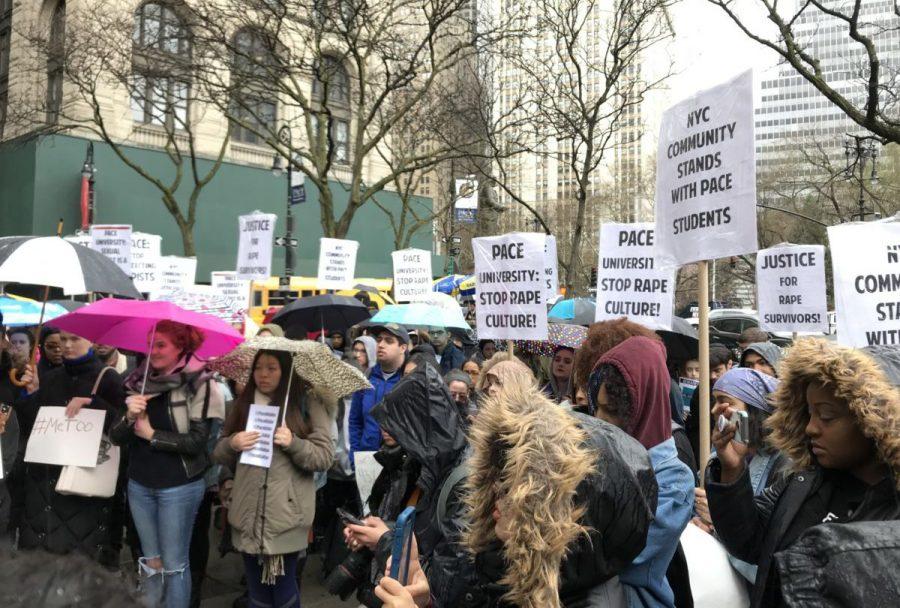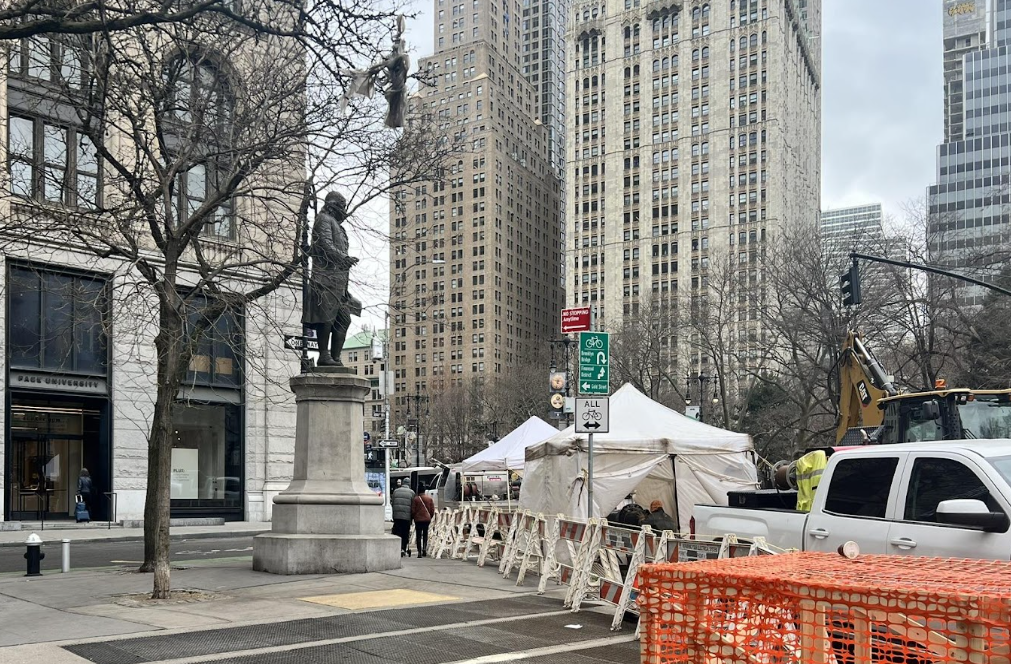The weather was unforgiving on Thursday, April 19, but it didn’t stop over 150 people from descending upon the front of One Pace Plaza and braving the cold and the wet to protest sexual violence. Students and faculty gathered in front of the school, walking out of class to demonstrate their aggravation with the University’s alleged inaction when it came to cases of sexual violence.
One case in particular stands out: Ariella Riapos, a senior at the University, made a Facebook post that went viral among the student body in which she detailed the sexual violence that she experienced at the hands of another student, who had allegedly sexually abused other women before Riapos. He is no longer enrolled at the University. “His freshman year,” she told the crowd at the walkout, “he was reported by two women for assaulting them at a party, and nothing was done. I repeat, nothing was done. So when I got here my freshman year, he was still here, and I had no idea. I was perfect prey for him.”
Riapos’s experience with the student, as well as similar cases reported by other women at the University, spurred Riapos into action. She, along with members of PaceUEndRape, brought suggestions for how the University can modify the policies that already exist to the Student Government Association, Dean for Students Marijo Russell-O’Grady, and the administration on April 11. However, according to Sydney Korman, the executive director of PaceUEndRape, their solutions were not being taken into consideration.
“We are not being heard,” Korman said at the walkout, “so we are trying to be louder.”

The walkout was the result of their attempts to amplify their voices: clipboards with petitions were circulated throughout the crowd, asking students to put their information down to prove that the demands being made of the administration were approved by members of the University community.
The demands that Riapos and PaceUEndRape put forth were posted in the Facebook page for the walkout and included items related to the enforcement of no-contact orders, the “lack of education” for faculty and staff about their responsibility to report incidents, and the issue of security allowing personae non-gratae into academic buildings. See the full list of complaints and solutions here.
These demands were directly influenced by Riapos’s experience at the University. According to Riapos, the student who abused her violated the no-contact order that they were issued more than once, and yet no disciplinary action was taken. A no-contact order is a conflict management tool that stipulates that two individuals may not speak to or about each other, nor are they allowed contact with people associated with the other party. They are also not allowed to be in the same room together.
“[The administration was] not escalating the situation the way that [they] needed to be escalating it,” Riapos said. “There’s no urgency in this.”
During one of his violations, the student reportedly entered the Collaborative Learning Room in the library, in full view of Riapos, and began working. She told The Pace Press that when she went down to the security desk, they had no record of her no-contact order.
“I had to produce my no-contact, and then they went upstairs and escorted him out. They should have my name on file and be able to check it real quick and go,” she said.
In response to a question about security protocol for situations like this, Executive Director of Safety and Security Vincent Beatty said, “Each security staff member is given a copy of the no-contact order and persona non grata orders along with a picture of the individual banned from campus. Copies are kept at each post for regular review and reference.” When asked, security guards at 41 Park Row and the 3 Spruce Street entrance of One Pace Plaza (whose names have not been published to protect their identities) did not know what no-contact orders were and needed to have it explained to them. Personae non-gratae, on the other hand, are registered in the security system and would not be allowed in through the turnstiles. However, for entrances that do not operate with turnstiles, they may still enter the school, as security could not produce the list of personae non-gratae when asked and needed to consult the security manager.
In addition to the no-contact order issue, Riapos said that her reports to various staff members were not taken to the Title IX representative on campus. When she came to Dean O’Grady and Assistant Dean for Students Patrick Roger-Gordon on Sept. 27, 2016, Riapos reportedly told them “everything. They knew the ins and outs of the situation.” In response, Roger-Gordon emailed Riapos back, saying the issue would be reported to Title IX. However, Riapos said that a Title IX representative never reached out to her after Roger-Gordon’s report to open a case.
Later, when Riapos went to Office of Sexual Assault Prevention and Education Director Jessica Garet herself to report the situation in May of 2017, Garet was, according to Riapos, “floored.” Garet reportedly said, “Wow, [he] has really slipped through the cracks at every turn” and insinuated that she had not heard anything about the case before. The Pace Press did not reach out to Garet because she is a confidential resource and cannot comment on the case.
When asked about these allegations, Dean O’Grady responded, “I can’t talk about her case specifically because it’s a privacy issue, but I can say to you that every time anybody has reported anything to me, I have reported it to Title IX.”
Riapos also told The Pace Press that she had relayed the issue to one of her professors, who was an adjunct and was reportedly not made aware of their responsibility to report, since adjuncts, according to Dean O’Grady, are not required to take sexual assault education classes.
This incident raises questions about the University’s overall approach to sexual misconduct cases on campus, especially with regard to the use of no-contact orders as a conflict resolution tool.
Former University student Lilly M. said in a Facebook post responding to the walkout, “When I was a student at Pace, I wasn’t allowed to talk about what happened, because of the no-contact order. If the school found out that I was telling people about the other student who raped me, they would have taken my dorm away from me.”
One of the reasons why Riapos said she is fighting for change regarding this issue in particular is that no-contact orders “silence” people.
“The way they described [no-contact orders] is that it’s good for conflict management. For roommates who don’t get along, sure, great policy. For a sexual assault survivor? For a domestic violence survivor? That’s some bullsh*t,” said Riapos.
“With respect to no-contact orders, we issue no-contact orders for a myriad of kinds of things,” Dean O’Grady explained. “It could be roommates or a professor and a student who aren’t getting along, to issues like this. A no-contact really is in place to keep those individuals separated. It has some steps on it and it talks about keeping them apart. When someone violates a no-contact order, and I’m not speaking specifically here, just in general, we investigate, follow up, and action is taken. We file a report. If someone has really egregiously violated a no-contact, serious action can take place. There’s a progression within that violation.”
According to Dean O’Grady, the University has already begun to talk at all levels about reviewing policy. As reported by Director of Safety Beatty, even the security protocol is “being reviewed with the Dean for Students and legal counsel.”
These reviews involve benchmarking exercises in which Dean O’Grady has compared Pace University’s policies with that of 40 other colleges. She examines the language of the policies, the protocol in case of no-contact order violations, and the degree to which Title IX officers at other schools work with those schools’ deans.
“This is an opportunity for us to go back on our policies and take a look at the language on that,” said Dean O’Grady. “I think all of this is making a more positive change so that all the students feel represented by the policies.”
This article was also published in the May 2018 print issue of The Pace Press.
UPDATE: A previous version of this story did not include testimony from the security guards at 41 Park Row and One Pace Plaza. It also presented the plural of “persona non-grata” as “personas non-grata” and has been updated to reflect the correct plural form, “personae non-gratae.”

















